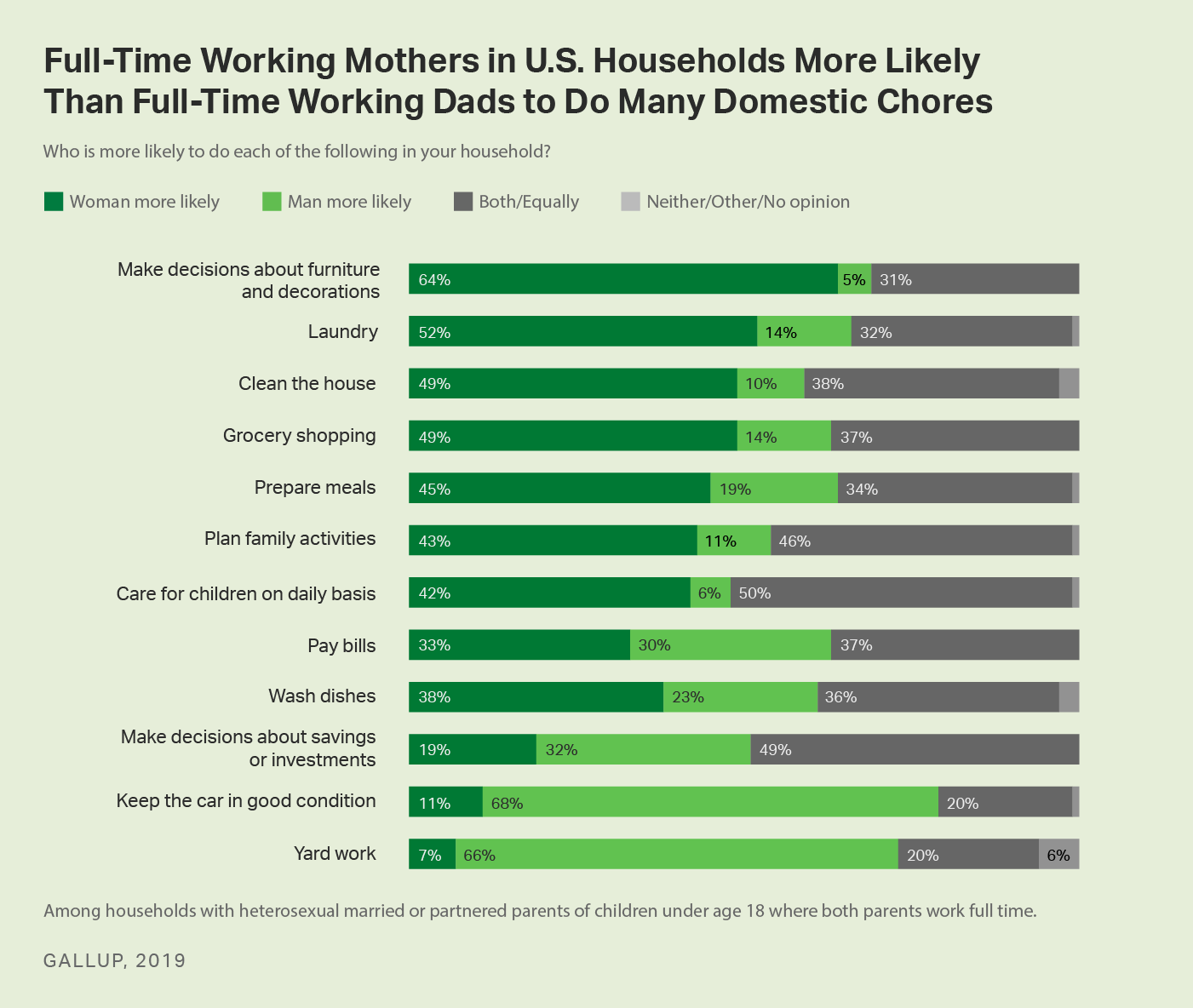Story Highlights
- 52% of working mothers do the laundry
- Working moms more likely than dads to clean, shop, care for kids, cook
- Moms working full time do fewer tasks than moms who don't work full time
WASHINGTON, D.C. -- As working mothers in the U.S. continue to fight for equality in the workplace, many are also simultaneously and disproportionately handling key domestic chores on the home front. In households where married or partnered mothers and fathers both work full time, the wives are more likely than their husbands to take the lead on everything from doing laundry, cleaning, shopping for groceries, and preparing meals, to planning family activities, caring for children and furnishing the house.
At the same time, as in most U.S. households, majorities of working mothers say the man of the house takes care of the yard and the car.

These findings, based on women in heterosexual couples who are married or living together, work full time, and have children younger than the age of 18, come from combined data from three Gallup polls in the U.S. conducted in June, July and August 2019.
U.S. Working Moms Report Working Fewer Hours Than Working Dads
Employed mothers work fewer hours on average than employed fathers. This partly reflects mothers' tendency to work part time and to work fewer hours even if they do work full time.
Employment snapshot of working mothers and fathers:
- Two-thirds of married mothers with children younger than age 18 work either full (50%) or part time (17%), according to the combined 2019 data.
- 92% of married fathers with children under 18 work either full (88%) or part time (4%).
- Among those who are employed full time, mothers work an average of 44 hours per week, while fathers work an average of 50.
Differences Between Married Mothers Who Work and Those Who Stay Home
The distribution of household chores varies depending on whether both parents work full time or only the husband does, while the wife works part time or not at all.
The division of labor in households in which both parents work full time is generally more equitable than in those in which only fathers work full time. That is, full-time working mothers are significantly less likely than mothers who do not work full time to be the primary partner performing domestic roles. Still, women in fully employed households with children shoulder more of the household work than the men for eight of the 12 household tasks measured, including caring for the children.
| Both parents work full time | Only father works full time | |||||||||||||||||||||||||||||||||||||||||||||||||||||||||||||||||||||||||||||||||||||||||||||||||||
|---|---|---|---|---|---|---|---|---|---|---|---|---|---|---|---|---|---|---|---|---|---|---|---|---|---|---|---|---|---|---|---|---|---|---|---|---|---|---|---|---|---|---|---|---|---|---|---|---|---|---|---|---|---|---|---|---|---|---|---|---|---|---|---|---|---|---|---|---|---|---|---|---|---|---|---|---|---|---|---|---|---|---|---|---|---|---|---|---|---|---|---|---|---|---|---|---|---|---|---|---|
| % | % | |||||||||||||||||||||||||||||||||||||||||||||||||||||||||||||||||||||||||||||||||||||||||||||||||||
| Laundry | ||||||||||||||||||||||||||||||||||||||||||||||||||||||||||||||||||||||||||||||||||||||||||||||||||||
| Woman more likely | 52 | 71 | ||||||||||||||||||||||||||||||||||||||||||||||||||||||||||||||||||||||||||||||||||||||||||||||||||
| Man more likely | 14 | 5 | ||||||||||||||||||||||||||||||||||||||||||||||||||||||||||||||||||||||||||||||||||||||||||||||||||
| Both equally (vol.) | 32 | 23 | ||||||||||||||||||||||||||||||||||||||||||||||||||||||||||||||||||||||||||||||||||||||||||||||||||
| Clean the house | ||||||||||||||||||||||||||||||||||||||||||||||||||||||||||||||||||||||||||||||||||||||||||||||||||||
| Woman more likely | 49 | 64 | ||||||||||||||||||||||||||||||||||||||||||||||||||||||||||||||||||||||||||||||||||||||||||||||||||
| Man more likely | 10 | 5 | ||||||||||||||||||||||||||||||||||||||||||||||||||||||||||||||||||||||||||||||||||||||||||||||||||
| Both equally (vol.) | 38 | 30 | ||||||||||||||||||||||||||||||||||||||||||||||||||||||||||||||||||||||||||||||||||||||||||||||||||
| Grocery shopping | ||||||||||||||||||||||||||||||||||||||||||||||||||||||||||||||||||||||||||||||||||||||||||||||||||||
| Woman more likely | 49 | 56 | ||||||||||||||||||||||||||||||||||||||||||||||||||||||||||||||||||||||||||||||||||||||||||||||||||
| Man more likely | 14 | 13 | ||||||||||||||||||||||||||||||||||||||||||||||||||||||||||||||||||||||||||||||||||||||||||||||||||
| Both equally (vol.) | 37 | 31 | ||||||||||||||||||||||||||||||||||||||||||||||||||||||||||||||||||||||||||||||||||||||||||||||||||
| Prepare meals | ||||||||||||||||||||||||||||||||||||||||||||||||||||||||||||||||||||||||||||||||||||||||||||||||||||
| Woman more likely | 45 | 64 | ||||||||||||||||||||||||||||||||||||||||||||||||||||||||||||||||||||||||||||||||||||||||||||||||||
| Man more likely | 19 | 9 | ||||||||||||||||||||||||||||||||||||||||||||||||||||||||||||||||||||||||||||||||||||||||||||||||||
| Both equally (vol.) | 34 | 26 | ||||||||||||||||||||||||||||||||||||||||||||||||||||||||||||||||||||||||||||||||||||||||||||||||||
| Care for children on daily basis | ||||||||||||||||||||||||||||||||||||||||||||||||||||||||||||||||||||||||||||||||||||||||||||||||||||
| Woman more likely | 42 | 69 | ||||||||||||||||||||||||||||||||||||||||||||||||||||||||||||||||||||||||||||||||||||||||||||||||||
| Man more likely | 6 | 2 | ||||||||||||||||||||||||||||||||||||||||||||||||||||||||||||||||||||||||||||||||||||||||||||||||||
| Both equally (vol.) | 50 | 29 | ||||||||||||||||||||||||||||||||||||||||||||||||||||||||||||||||||||||||||||||||||||||||||||||||||
| Wash dishes | ||||||||||||||||||||||||||||||||||||||||||||||||||||||||||||||||||||||||||||||||||||||||||||||||||||
| Woman more likely | 38 | 54 | ||||||||||||||||||||||||||||||||||||||||||||||||||||||||||||||||||||||||||||||||||||||||||||||||||
| Man more likely | 23 | 12 | ||||||||||||||||||||||||||||||||||||||||||||||||||||||||||||||||||||||||||||||||||||||||||||||||||
| Both equally (vol.) | 36 | 32 | ||||||||||||||||||||||||||||||||||||||||||||||||||||||||||||||||||||||||||||||||||||||||||||||||||
| Based on heterosexual couples who are married or living together. Those who volunteered that neither spouse does the task are not shown. | ||||||||||||||||||||||||||||||||||||||||||||||||||||||||||||||||||||||||||||||||||||||||||||||||||||
| GALLUP, 2019 | ||||||||||||||||||||||||||||||||||||||||||||||||||||||||||||||||||||||||||||||||||||||||||||||||||||
Paying bills is the only task that full-time working mothers are more likely to do than those who don't work full time. Meanwhile, mothers' roles in five other household responsibilities are the same regardless of their employment status -- they are most likely to make decisions about home furnishings, their husbands are most likely to handle car and yard maintenance, and they share the decision-making about savings and investment and family activity planning.
Bottom Line
Married working mothers of children younger than 18 often struggle with work-life balance and feeling like there aren't enough hours in the day to accomplish all that they must at work and at home. Majorities of them say they are still primarily doing most of the household chores that were "women's work" in the age when mothers didn't work outside the home.
The time and energy required to fulfill modern expectations of raising children, preparing fresh meals, doing housework and yardwork, and managing one's finances is formidable. While couples find different ways to divide these duties, more often than not, the woman in the relationship takes on more of the domestic roles while the husband prioritizes full-time employment or longer work hours.
Some working mothers may be choosing to work part time to give them the hours and flexibility needed at home. Others work full time but work fewer hours, on average, than their husbands. While both decisions could influence women's career goals, what's not clear is whether these decisions are made intentionally and willingly, or because men and women adopt traditional roles without full appreciation for the effect on women's career aspirations.
The answer could be a bit of both. Although recent Gallup data shows that U.S. women overall are more likely now than they have been in the past three decades to say they prefer to work outside the home than to stay at home and take care of their house and family, half of mothers of children under the age of 18 say their preference is to stay home (50%), while just under half would rather work (45%).





